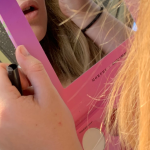Grit & Gravel is a Glass column that delivers you the daily discussions you hear circling around your social cliques. Alike friendly discussion, it offers holistic opinions to better understand this strange life that we live.
This edition is about Dr Melissa Kang and Yumi Stynes’ book Welcome to Sex, the discussion of taboo topics on public forums and modern-day censorship.
Working in a bookstore, there usually isn’t a lot of drama that you wouldn’t normally find in a retail environment. The online book community are a completely different story but the job is customer service – there’s not a lot of gossip.
However, one morning my manager pulled us all aside next to look at a pile of newly delivered books: Welcome to Sex: Your no-silly-questions guide to sexuality, pleasure, and figuring it out by Dr Melissa Kang and Yumi Stynes. The stack leaned like Pisa, waiting for one wrong touch for it to crumble down like ancient ruins. The book itself was a trove of information for adolescents and a saviour for parents in hopes of answering all questions, one that had proven its popularity.

Regardless of the book’s intentions, the store had received complaints. Both my managers received backlash from customers who couldn’t comprehend selling a book like Welcome to Sex, even if we already sell books like Where Did I Come From? (one that, weirdly enough, was the book my mother gave me years ago). Customers had also rallied bystanders nearby into the conversation, engaging them in their argument of banning the book permanently. It didn’t matter that my managers weren’t the authors. The fact that their store was associated with the book that they describe as an ‘instructional sex manual’ was offensive enough.
Uproar about Welcome to Sex began after a video was posted online by ‘podcaster’ Chris Primod, who claimed the book’s purpose was to “groom our children.”
Australian organisation Women’s Forum then jumped on board the bandwagon, a group who, according to their website, are opposed to pro-trans activism (labelling transitioning as the ‘erasure of biological sex’), euthanasia, and surrogacy. Chief executive Rachael Wong referred to the book as a “graphic sex guide for children” that is “prematurely exposing them to graphic, highly sexualised material.” But wouldn’t we like to think that a book teaching young people about sex has scientific fact behind it?
And it does. Some might recognise Dr Kang as Dolly Doctor for Dolly Magazine – a woman that young girls could reach out to with questions they felt too scared to ask while also receiving informative insights into dating and love. It was a column that I would often skim to as a teenager whenever I had a copy (usually when Ariana Grande was on the cover). Dr Kang didn’t hold any judgement to the raw and honest letters sent by young Australian girls. Even if I didn’t have anything to ask, just knowing that someone was giving you practical advice without holding back was comforting. Additionally, Welcome to Sex incorporates the perspectives of a myriad of professors, sexologists, and even stakeholders who prevent sexual abuse to answer teenagers’ questions about coming of age.
And there’s proof that sexual educational resources are essential. One Australian survey found that 70% of high school students rely on Google and social media to be their sex-ed personnel since either a) the education system failed to answer their questions or b) felt too ashamed to ask a teacher, friend, or family member. Having to resort to online forums and the wild west of TikTok to answer questions about sex is a major concern for the modern day.
It is alarming that these specific groups and the other generations of adults are attempting to ‘protect’ young people from their own curiosity about sex. Co-author Stynes has been vocal against the backlash, suggesting that groups against the publication of Welcome to Sex are “taking a leaf out of the book of Trumpism and fearmongering.” Groups like Women’s Forum say they’re all for equality, but when we are attempting to silence educated authors – two women who have done extensive research, one of which specialises in young adult and sexual health at a doctorate level – the broader conversation about feminism stalls. There is only so much protecting you can do. Where their educators can’t or won’t answer them is when young people are going to take the initiative and find things out for themselves.
So, what exactly are we protecting them from?
Protestors are attacking the book, the women behind it, the publishers, and the booksellers. But what they are truly hurting is the free discussion of a topic that shouldn’t be taboo.
When learning about ‘taboos’ in high school, I discovered that what seems taboo to one might already have grown on another to feel normal. For me, this kind of normalisation is likely owed to my best friend, who was openly discussing topics of sex, pornography, and mental illness since we met at 14. By being subjected to a plethora of thoughts – believe me, there’s a lot in their mind – I realised that these certain ‘taboo’ topics need to be discussed.
Without discussion of sex, there would be no talk of safe sex and intimacy.
Without discussion of pornography, there would be no talk of consent and differentiating between what is real and what is wrong.
Without discussion of mental illness, there would be no platform for those to openly reveal the thing that rips them apart between crisp bedsheets on nights when the sky is bleak.
Without having candid discussions like this with my best friend, sex would be something I would awkwardly laugh at while in disbelief that someone is even bold enough to talk about a sexual encounter they had the night before.
So, we are conditioned. But we can be open and normalise these discussions that are as easy to say as ‘How was your day?’
This is essentially censorship. It’s a word that I find myself tiptoeing over when using it in modern contexts, but it is important; taking away voices that discuss sex, self-pleasure, queerness, and gender identity digs the point into the dirt that prevents us from growing into windswept trees.

Welcome to Sex is not the first and unfortunately won’t be the last to receive criticism like this. Gender Queer by Maia Kobabe – a graphic novel memoir that details Kobabe’s personal journey around gender, sexuality, and identity – was described as the ‘most banned and challenged book in America’ since 2021. Against censorship, Kobabe discusses how stories can be mirrors for some and windows for others, that “if a book does not seem useful or valuable to one reader, it might be deeply valuable to another.”
Some might say sex is not really considered a taboo anymore – it’s found on every form of media, more often in public platforms – but it obviously still has shock factor considering that workers of bookstores and large retailers like Big W have received verbal abuse from the public protesting against the book being sold in stores. But it is the lasting impact of this discussion that makes it so important to talk about.
Welcome to Sex is progressive. Sky News reporters and United Australia Party senators can call it a repercussion of ‘woke culture’ as much as they want, but sex-ed books will continue to be produced. What is important to discuss with young people is not just sex, but the other conversation hidden between the lines: consent, sexual health, identifying sexual abuse, informing the dangers of sexual predators including online. Especially with young girls, it is so important to communicate with young people about sex and their growing bodies.
Well-known Australian activist Clementine Ford, known for her outspoken views on feminism, sex, and love, took to Instagram stories on July 24th and questioned those who were outraged by the contents of the book. She described a ‘crossover’ between those who believe that providing informative information about sex and pleasure is violating children, and men who hope for the next generation of boys to look up to the likes of Andrew Tate. “What [protestors] don’t want are all of the messages in that book getting out to girls, which is that they’re entitled to say no; which is that they’re entitled to pleasure; which is that they’re entitled to reject interaction with men entirely,” Ford said.
We can no longer gatekeep to ‘protect’ the youth. What we can do is guide them as much as we can when they are ready. Otherwise, as one teenager said to researcher Catharine Lumby: “We are just asking each other. We’re matching socks in the dark.”









